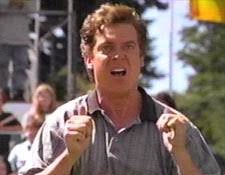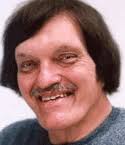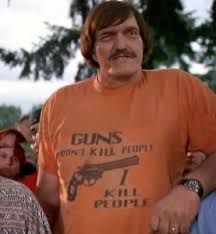| We're all Born for Things |
This was a brief conversational interlude that went on at Franklin Park as I was trying out my bare-foot jogging. This event weaves through some of the main ideas of this entry.
"Doesn't that hurt running bare-foot?"
"Yes m'am."
"Why are you doing it than?"
"I've heard it's good for my feet if I do it enough..."
"Do you really think you'll be conscientious enough to keep this up, you don't seem like the type of individual that would."
"You're probably right m'am."
"I don't know why you're running that way than. It's silly if you ask me and you probably need some direction in your life."
"Thank you mam."
"I don't know why you're running that way than. It's silly if you ask me and you probably need some direction in your life."
"Thank you mam."
"You look a little foolish you realize and you're also going at the same pace as me because you're in so much pain and I'm just walking."
"Thank you M'am, I just misplaced my shoes as I hid them under some leaves... I'm a little off course."
"A lot off course I'd say...Why did you hide your shoes? That seems foolish".
"Well I had to take them off, and I figured someone might take them"
"Why would someone want your stinky shoes that are probably in pretty shoddy condition and don't fit most people's regular sized feet?"
"Thank you m'am, point taken."
Ok, the lady was much nicer than this I'm embellishing for the sake of romance. Just to summarize though... my barefoot running was inspired by a completion of the "Born to Run Book" by Chris McDougalstein or something. This book explored the nature of running stemming from the frustration that apparently many modern day american runners experience. They are so injured all the time despite our fancy shoes. I thought I just ran like a sasquatch which is why I'm always hurt / frightened during a saunter. The author explores the world of ancient running cultures, namely the Tarahumara in the copper canyons in Mexico looking to see how and why they run real good. Apparently it's partially due to not having the really spanky Nike shoes with cushioning; they wear sandals; thin ones.
Our handsome author delves further into the nature of running and human evolution, citing evidence that humans evolved as long distance running creatures and we're built for it. He explains some of the mechanisms of the foot and our upright nature that makes us so good at distance running to the point that we could actually catch up to and slaughter a whole horse if we needed to. Lord knows I will do soon. Nike's fairly evil. However, we've lost out on most of this as the modern running shoes sort of put your foot in a tomb and cushion it ever so that it changes the style of your running where we don't develop the muscles in our foot that we have the potential to. Also, the cushioning extends your stride to the point where so much of the impact travels through your joints and knees. It's clunky.
Going even further, McDingals cites research that argues that this is how we survived past our neanderthal peers. We chased down game, tiring them out to the point of death and exhaustion. As the climate changed from the ice age to a wamer climate, we thrived whereas neanderthals declined. That's how we do essentially this book argued.
The author has a great race with all his new friends down in Mexico, he talks about how he we need to start running again as a society with fun in mind and with less cushioning and stuff, and now I've just spoiled everything for everyone except you've probably read this book like five years ago and this is ancient history... There you have it.

I liked the book. The author Jared was a little too exuberant about all his "conclusions". He's gotta tone it down a bit and stop playing "sammy the scientist" and remember that his evidence is evidence, but there's many different ways to collect and analyze data and their is plenty of contrary date out as well. Anyways I should stop playing some literary critic as I don't even know where I am right now.

This book was fun, and had some neat ideas. I'm a sucker for anything "innate to human nature" and I was interested to try out them minimalist shoes and see if I too was "born to run". Prior to this I had "completed" a half marathon. The aches and pains killed me and by mile 10 I was walking (though I finished it in good stride as a kind fellow runner prodded me to do so with gentle cajoles). So I've tried some of this barefoot running and such. I'll have a bit of it when I cross over a grassy knoll or a golf course during a larger run.

I got the funny five fingah shoes. I can't begin to run in those as based on my preliminary research I'll certainly get planar fraciitis as many others have. I have really flat feet which is problematic. When I walk in them I can't say that I feel welcome in society by any means. I feel like people see me and probably think I'm some type of amphibious creature that's gonna poach their chickens. Them glove shoes look real weird. But I'm trying to build up my arches enough to be able to get started with them.

So I don't know what to say in the end and I don't have anything to add. The barefoot running seems like a nice thing to try, but definitely slowly without running too hard, long or fast. Here is a link to a little how too with Mr. McDougal demonstrating some silliness on how to prepare your feet for bare running. He's a real guru and we should be so lucky, but who am I to satirically deride... what did I ever do that's worth putting on a mantel.
Going into this book, I also thought that this running thing is not a big deal. So what if we don't run as a society? Society's got some real issues right now, running seems like the least of it. Author McDingal does a nice job of making this activity important. We're unhealthy as a society, and McDougal maybe believes that reminding / teaching us to return to what he believes as our origin as a species is what would really make us healthier physically and mentally. We're meant to run and we need to keep doing it. We often think of running as this separate entity, but it's something that for much of our history was ingrained into our survival and maybe it still can be and we'd be much better off for it. Running and the mindset of of being active is certainly relevant and important in our day and age.

I like the idea of this book. I like running. It's always been something that makes me feel lively again and helps me unblock mentally and physically. I like the idea of our ancestors doing it for a large part of their waking moments, that it's helped them and us advance as a species. As anything in science, it's just a theory without complete validity but it's a nice one. Born to Run makes this running and ultra-running lifestyle more feasible, both by providing examples, tips and inspiration in getting us to be more active and appreciate what we as humans are capable of. Whether it's right or wrong I like it.
Our handsome author delves further into the nature of running and human evolution, citing evidence that humans evolved as long distance running creatures and we're built for it. He explains some of the mechanisms of the foot and our upright nature that makes us so good at distance running to the point that we could actually catch up to and slaughter a whole horse if we needed to. Lord knows I will do soon. Nike's fairly evil. However, we've lost out on most of this as the modern running shoes sort of put your foot in a tomb and cushion it ever so that it changes the style of your running where we don't develop the muscles in our foot that we have the potential to. Also, the cushioning extends your stride to the point where so much of the impact travels through your joints and knees. It's clunky.
Going even further, McDingals cites research that argues that this is how we survived past our neanderthal peers. We chased down game, tiring them out to the point of death and exhaustion. As the climate changed from the ice age to a wamer climate, we thrived whereas neanderthals declined. That's how we do essentially this book argued.
| My running style is like this guy's... hard and inane. |
I liked the book. The author Jared was a little too exuberant about all his "conclusions". He's gotta tone it down a bit and stop playing "sammy the scientist" and remember that his evidence is evidence, but there's many different ways to collect and analyze data and their is plenty of contrary date out as well. Anyways I should stop playing some literary critic as I don't even know where I am right now.
This book was fun, and had some neat ideas. I'm a sucker for anything "innate to human nature" and I was interested to try out them minimalist shoes and see if I too was "born to run". Prior to this I had "completed" a half marathon. The aches and pains killed me and by mile 10 I was walking (though I finished it in good stride as a kind fellow runner prodded me to do so with gentle cajoles). So I've tried some of this barefoot running and such. I'll have a bit of it when I cross over a grassy knoll or a golf course during a larger run.
I got the funny five fingah shoes. I can't begin to run in those as based on my preliminary research I'll certainly get planar fraciitis as many others have. I have really flat feet which is problematic. When I walk in them I can't say that I feel welcome in society by any means. I feel like people see me and probably think I'm some type of amphibious creature that's gonna poach their chickens. Them glove shoes look real weird. But I'm trying to build up my arches enough to be able to get started with them.
So I don't know what to say in the end and I don't have anything to add. The barefoot running seems like a nice thing to try, but definitely slowly without running too hard, long or fast. Here is a link to a little how too with Mr. McDougal demonstrating some silliness on how to prepare your feet for bare running. He's a real guru and we should be so lucky, but who am I to satirically deride... what did I ever do that's worth putting on a mantel.
Going into this book, I also thought that this running thing is not a big deal. So what if we don't run as a society? Society's got some real issues right now, running seems like the least of it. Author McDingal does a nice job of making this activity important. We're unhealthy as a society, and McDougal maybe believes that reminding / teaching us to return to what he believes as our origin as a species is what would really make us healthier physically and mentally. We're meant to run and we need to keep doing it. We often think of running as this separate entity, but it's something that for much of our history was ingrained into our survival and maybe it still can be and we'd be much better off for it. Running and the mindset of of being active is certainly relevant and important in our day and age.
Comments
PS Your writing as as quirky as you are...